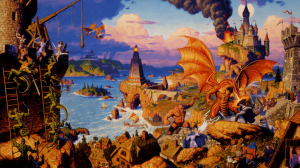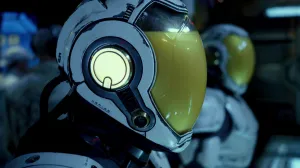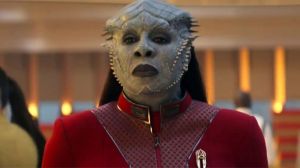In Deadweights, creators Tyrone Finch and Sebastián Piriz ask, “Is there life after super-villainy?” The first issue wastes no time in arriving at that core conceit, opening in media res as a team of supervillains fall out of the sky, having had their butts handed to them once again by a superteam called the Paladins. However, the debut issue seems unsure how to answer its central question. A clashing of tones that fails to commit to one sensibility or another, or even to the tension between, creates a disorienting reading experience that fails to pose some obvious and important questions about its central characters.
Videos by ComicBook.com
Those characters are Bounder and Cannonbulk, two mid-level villains with superpowers—Bounder can seemingly leap and move with great speed, and Cannonbulk is super strong—who get cut from the team after their most recent defeat. This dismissal is the last straw for Cannonbulk, who decides he wants to leave super-villainy behind and live a more mundane life. As Cannonbulk begins his walk back toward the life of an everyman, Bounder tags along, attempting to get Cannobulk to reconsider his decision. The duo tries to swipe some clothes from a clothesline only to find themselves caught by the owner, who drags them with her to work off their payment for the clothing by helping to clean up the mess left behind by their superpowered battle, oblivious to the two strangers’ or their role in the conflict.
Deadweights plays Cannonbulk against Bounder. Cannonbulk is dead-set on transitioning to civilian life and remaining uninvolved in further supervillain activities. Bounder can’t imagine why Cannonbulk would want to leave behind their dream of subjugating the world. Cannonbulk’s seriousness about the matter versus Bounder’s flippant confidence that Cannonbuk will eventually come to his senses leads to discontinuity in tone. Bounder’s over-the-top dialog and thinking lends itself to a comedic reading. Cannobulk’s seriousness as he comes face-to-face with the consequences of his actions,—including the realization he’s wearing the clothes of a bystander killed during his battle with the Paladins—is more suited to a grounded drama; this makes it difficult to understand if readers should be laughing or crying, mostly leaving one confounded.
The artwork doesn’t clarify matters since the aesthetics don’t lean much in either direction. The visuals lack the exaggeration one might expect from a comedic interpretation of the script and the dramatic framing and coloring that might come with something meant to be more dramatically moving. It is possible to pull off doing both, especially if the comedic scenes play off the dramatic ones visually, but there’s no strong evidence of such an effort here.
It’s all compounded by a lack of clarity on how we should feel about the protagonists. Bounder has a way to go since he’s still clinging to the dream of world domination. Meanwhile, Cannonbulk wants to leave villainy behind, but he’s not turning himself in either. He seems determined not to take responsibility for his actions, instead wanting to blend in with society and live a mundane life. Maybe there’s a point to be made about bad actors often seeking to avoid blowback after their deeds catch up with them. Yet, nothing about Deadweights #1 coalesces around that or any other clear perspective.
And that’s the problem with Deadweights #1. It’s asking a big question with many possible answers but doesn’t seem to have a strong conception of how it wants to reply. It could lean into the inherent ridiculousness of the genre, use that same genre to make a relatable point about our world, or deliver a conflicted character study. But not committing to any purpose leaves this a muddled debut.
Published by Ahoy Comics
On April 10, 2024
Written by Tyrone Finch
Art by Sebastián Piriz
Colors by Sebastián Piriz
Letters by Rob Steen
Cover by Sebastián Piriz








